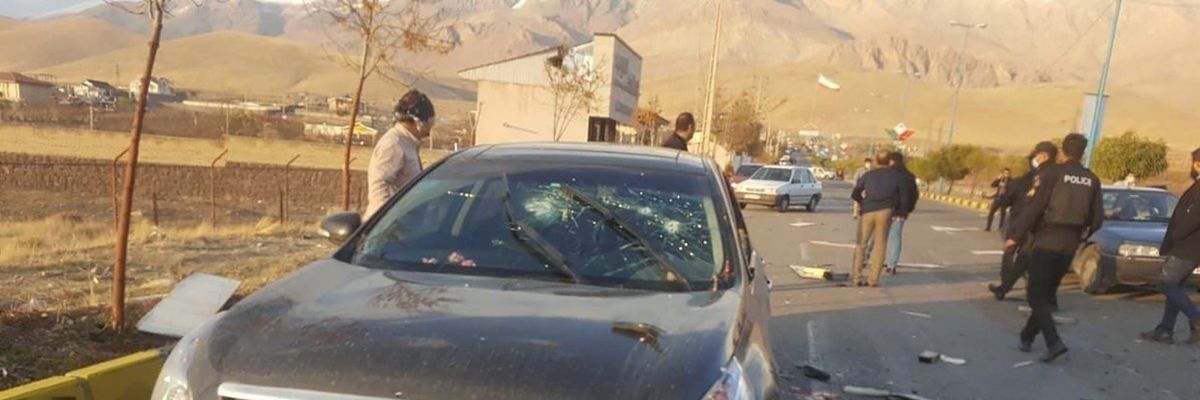Mohsen Fakhrizadeh, a key Iranian nuclear official, has been assassinated in Tehran. While it's unclear as of this writing who is responsible, Israel has assassinated numerous Iranian nuclear scientists in the past, but had, until now, been unable to get to the highly protected Fakhrizadeh.
Some Iranian reports claim it was a suicide attack, which would reduce the likelihood of Israeli operatives carrying out the attack, but the bullet holes in Fakhrizadeh’s car cast doubt on that.
Israel has in the past, however, used operatives from the the MEK — a cult-like Iranian exile group recently removed from the State Department's list of terrorist organizations — to conduct attacks in Iran. The MEK was the first group to introduce suicide assassinations to Iran.
But Israel is a prime suspect for several reasons: It has the expertise and capacity, has done it before, and has a motive.
While it's highly unlikely that Israel would have carried out the assassination without a green light from the Trump administration, a more direct U.S. role cannot be entirely discounted. The Trump administration has reportedly run several joint sabotage operations with Israel against Iran's nuclear facilities in the past year and relied in part on Israeli intelligence in carrying out the assassination of Gen. Qasem Soleimani outside the Baghdad airport last January. Earlier this month, Trump himself reportedly raised the possibility of attacking Iran with his top national-security advisers, while it was just last week that the administration's most prominent Iran hawk, Secretary of State Mike Pompeo, met with Israeli Prime Minister Benjamin Netanyahu, well as leaders of Iran's adversaries in the Persian Gulf, notably Saudi Arabia and the United Arab Emirates.
In any event, conducting attacks in Iran has few downsides for Israel right now. Iran could lash out and spark a broader conflict that sucks in the United States, bringing about a U.S.-Iran confrontation that Netanyahu has long sought.
Or, if Iran sits tight to wait to deal with President-elect Joe Biden, the Trump administration is highly unlikely to impose any costs on other Israeli provocations.
Either way, the assassination (and other likely future attacks) will likely harden Iran’s position and complicate — if not ultimately cripple — the Biden team’s attempts to revive diplomacy. That serves Netanyahu’s interest as well.
Indeed, Tehran’s openness to post-JCPOA negotiations on missiles and other matters will likely diminish if Israel engages in renewed assassinations in Iran. In fact, the Obama administration condemned Israel’s earlier assassinations precisely because it knew the murders wouldn’t so much set back Iran’s nuclear program, as it would any efforts to negotiate a deal to curb it.
Assuming Israel's responsibility and the Trump administration's acquiescence, if not complicity, in additional Israeli provocations, we now find ourselves in a similar, but perhaps more perilous situation for the next two months -- especially if Biden and his foreign policy team fail to strongly communicate that Israel will incur costs if it continues to carry out attacks inside Iran during the current interregnum.
As such, we should be prepared for a very bumpy ride pending Biden’s inauguration. And if it turns out that Israel was behind the assassination, there should be no illusions about Netanyahu’s desire to drag the United States into another endless war in the Middle East.
It's also important that the American public take note of the broader pattern. From around 2002 to 2012, Israel pressed the United States to address Iran’s nuclear program. During that period, Washington obligingly imposed ever-tougher sanctions against Tehran and repeatedly threatened military action. But those efforts failed as Iran systematically built up its nuclear capabilities.
Then, from 2012 to 2015, the United States tried real diplomacy -- along with the United Kingdom, France, Germany, Russia, and China -- culminating in the Joint Comprehensive Plan of Action (JCPOA), widely hailed as the most far- reaching non-proliferation agreement ever negotiated, and by which Iran agreed to sharply curb its nuclear program. Despite those constraints, Israel declared its opposition and successfully pressed the Trump administration to end U.S. participation in 2018 and impose new sanctions as part of its "maximum pressure" campaign against Iran.
Predictably, a series of escalations since then has brought the United States and Iran minutes away from war, twice.
But still, the war that many in Israel and in the United States have sought has yet to fully materialize. And now that Biden has defeated Trump, those who want war, particularly in Israel, likely see their window of opportunity closing. Meanwhile, Israel is coordinating with Trump, Saudi Arabia, and the United Arab Emirates for a flood of new sanctions designed to, again, at a minimum to sabotage Biden’s chances of restarting diplomacy with Iran.
If Israel was behind the assassination of Fakhrizadeh — which seems highly likely though not yet proven — it demonstrates the degree to which Netanyahu feels emboldened to undermine Democratic U.S. presidents with impunity and drag the United States into war.
U.S. strategic partnerships should serve to make the United States more, not less, secure. But that is where we are today with many American partnerships around the world. This will not change unless and until Washington decides to end its drive for military hegemony in the Middle East.
















